一般现在时,现在进行时,一般过去时,过去进行时,一般将来-改
一般现在时-现在进行时-一般过去时-过去进行时-一般将来---改

2) 表示有迹象表明即将发生的动作。 Look at the clouds in the sky, it’s going to rain . 瞧天上的云, 就要下于了。 3) go , come ,leave等表示位置移动的动词 用进行时表示将来。 He is leaving for Beijing next week . 他下星期将去北京。 I’m going to the teachers’ office. 我打算去老师的办公室。
left 7.They ____(leave) for England two days ago. did you_____(see) see 8.When ____ the film last week?
9.Who helped _______(help) the old man? John did ____(do).
特殊疑问句 疑问词+shall/will+主语+ +动词原形+ (其它成分)? Shall用于第一人称。 Will用于各种人称。 口语中常用will代替shall 。 一般将来时的用法: 1.表示自然的趋势, 如年龄、 气象报告的客 观性预测等。 1)I shall be sixteen years old next month. 下个月我将十六岁。
特殊疑问句: 疑问词+do +主语+动词原形+其它成分)? When do you usually go to bed? 2. 主语为第三人称单数 疑问词+does+主语 +动词原形+(其它成 分)?Where does Jim do his homework on weekdays ? 注动词的第三人称的变化跟名词变复数相同。 如: start-----starts , go-----goes ,do –does study------studies , have ----has
一般现在时--一般过去时---现在进行时--过去进行时归纳总结

一般现在时一般过去时现在进行时过去进行时1. 一般现在时(1)一般现在时的构成动词一般用原形,若主语为单数第三人称,则动词加词尾-s或-es,具体变化规则如下(与名词的单数变复数规则大致一样):1。
一般情况下由动词后加-s构成。
如:work→works 工作read→reads 读look→looks 看come→comes 来live→lives 居住listen→listens 听2.以s, x, z, sh, ch 以及字母o结构的动词,后加—es。
如:guess→guesses 猜mix→mixes 混和go→goes 去finish→finishes 完成catch→catches 抓住3.以辅音字母加y结尾的动词,应将y改为i 再加-es.如:fly→flies 飞行study→studies 学习carry→carries 带,扛一般现在时主要用动词的原形表示,如果主语是第三人称单数,则在动词原形式后加—s 或-es .如:Tom often helps his parents do housework at home。
汤姆在家经常邦助父母做家务。
Sometimes Lucy washes her clothes herself。
有时候露西亲自洗她的衣服。
(2)一般现在时的用法1)表示经常性或习惯性的动作或存在的状态。
与often ,always ,usually ,sometimes , once a week , every day 等表示频度的副词或时间状词连用.如:I often go to school by bike. 我经常骑自行车去上学。
2)表示客观事实或普遍真理。
如:The earth goes around the sun .地球绕着太阳转。
3)在时间、条件等状语从句中,用现在时表示将来。
如:If it rains tomorrow, we won't go to the park.如果明天下雨,我们就不去公园了。
一般现在时和现在进行时和过去进行和一般将来时和过去将来时
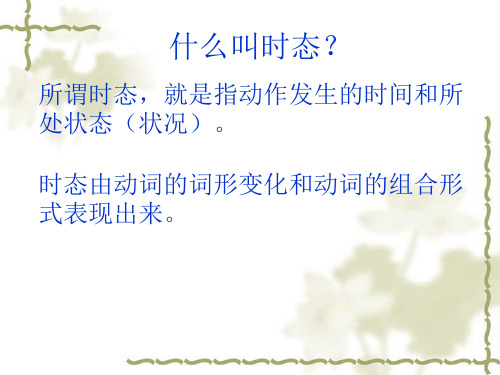
所谓时态,就是指动作发生的时间和所 处状态(状况)。
时态由动词的词形变化和动词的组合形 式表现出来。
那么时间有几种呢?
1.现在:眼下这一时刻,或一段时 间。这一时间伸缩性较大,可长可 短。英语用动词原形或现在式表现 在。 2.过去:指现在这时刻以前的某一 时刻、某一 段时间或者所有过去时 间。用动词的过去式表示过去。
现在
时态表示的4种时间
过去---指现在这时刻以前的某一时刻、某一
段时间或者所有过去时间。用动词的过去 式表示过去。 worked
过去某一时刻 现在
spoke
过去一段时间
时态表示的4种时间
将来 ---指现在以后的任何时刻、时段或全部时间。
用will或shall表示将来。
未来 某一时刻 现在
will work will speak
I am going to play computer games this afternoon.
We are going to sing this song together.
过去进行时
概念:表示过去某时 正在进行的状态或动 作。
现在,将过去进行时与现在进行时进行比较, 两者有何不同? He was dancing Nobody in the classroom yesterday.
7.The oldest kind of computer _____ the abacus. A. is B. was C. has been D. have been 8. I’ll tell him all about it as soon as he ____.
A. come back B. comes back C. will come back D. is going come back
英语16种时态

时态范畴英语语法中的时态(tense)是一种动词形式,不同的时态用以表示不同的时间与方式。
是表示行为、动作、状态在各种时间条件下的动词形式,在英语中有16种时态。
一般现在时一般过去时一般将来时一般过去将来时现在进行时过去进行时将来进行时过去将来进行时现在完成时过去完成时将来完成时过去将来完成时现在完成进行时过去完成进行时将来完成进行时过去将来完成进行时名词解释英语时态分为16种:一般现在、一般过去、一般将来、过去将来时,以及这四者的一般时、进行时、完成时和完成进行时下面就英语中常见的十种基本时态进行阐述,其它的时态都是在这十种时态的基础上结合而成的。
在语法里,时或时态表示行为发生的时间和说话时的关系。
一般分为过去式、现在式、未来式,通常也有与表示动作进行或终止的进行式和完成式等体貌一起相连用的情况。
时态连同语气、语态、体貌和人称为动词形式至少可能能够表现出的5种语法特性。
有些语言,没有时态的使用,如分析语的中文,但必要时,仍有时间副词的辅助。
也有些语言,如日文,形容词的词形变化能表达出时间上的资讯,有着类似动词的时态性质。
还有些语言,如俄文,一个单词就能表现出时态和体貌。
动词的现在时一般现在时1.概念:经常、反复发生的动作或行为及现在的某种状况。
2.时间状语:always,usually,often,sometimes,every week(day,year,month…),once a week,on Sundays,3.基本结构:动词原形(如主语为第三人称单数,动词上要改为第三人称单数形式)4.否定形式:am/is/are+not;此时态的谓语动词若为行为动词,则在其前加don't,如主语为第三人称单数,则用doesn't,同时还原行为动词。
5.一般疑问句:把be动词放于句首;用助动词do提问,如主语为第三人称单数,则用does,同时,还原行为动词。
6.例句:. It seldom snows here.He is always ready to help others.Action speaks louder than words.(1) 一般现在时表示经常性的动作或状态一般现在时表示经常性动作或状态时,常与often,always,usually,sometimes,every day等时间状语连用。
新概念知识点整理
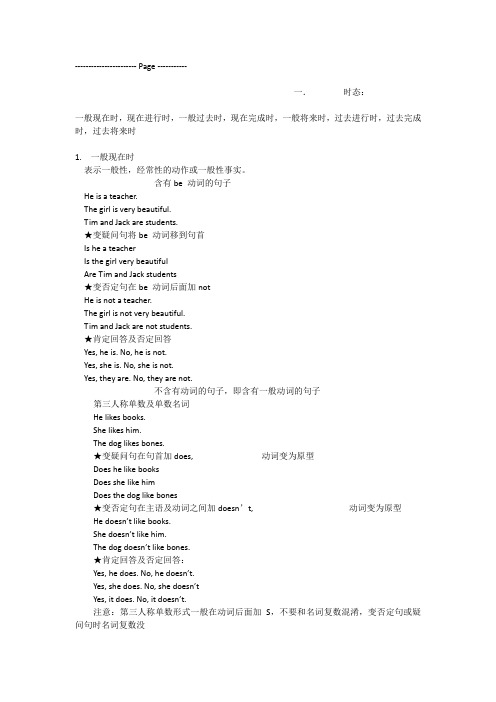
----------------------- Page -----------一.时态:一般现在时,现在进行时,一般过去时,现在完成时,一般将来时,过去进行时,过去完成时,过去将来时1. 一般现在时表示一般性,经常性的动作或一般性事实。
含有be 动词的句子He is a teacher.The girl is very beautiful.Tim and Jack are students.★变疑问句将be 动词移到句首Is he a teacherIs the girl very beautifulAre Tim and Jack students★变否定句在be 动词后面加notHe is not a teacher.The girl is not very beautiful.Tim and Jack are not students.★肯定回答及否定回答Yes, he is. No, he is not.Yes, she is. No, she is not.Yes, they are. No, they are not.不含有动词的句子,即含有一般动词的句子第三人称单数及单数名词He likes books.She likes him.The dog likes bones.★变疑问句在句首加does, 动词变为原型Does he like booksDoes she like himDoes the dog like bones★变否定句在主语及动词之间加doesn’t, 动词变为原型He doesn’t like books.She doesn’t like him.The dog doesn’t lik e bones.★肯定回答及否定回答:Yes, he does. No, he doesn’t.Yes, she does. No, she doesn’tYes, it does. No, it doesn’t.注意:第三人称单数形式一般在动词后面加S,不要和名词复数混淆,变否定句或疑问句时名词复数没有任何变化。
英语的时态和动词变化及过去式和过去分词doc
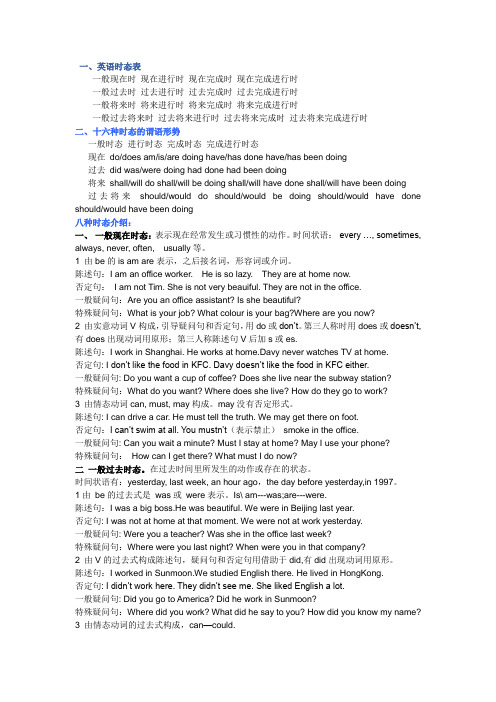
一、英语时态表一般现在时现在进行时现在完成时现在完成进行时一般过去时过去进行时过去完成时过去完成进行时一般将来时将来进行时将来完成时将来完成进行时一般过去将来时过去将来进行时过去将来完成时过去将来完成进行时二、十六种时态的谓语形势一般时态进行时态完成时态完成进行时态现在do/does am/is/are doing have/has done have/has been doing过去did was/were doing had done had been doing将来shall/will do shall/will be doing shall/will have done shall/will have been doing 过去将来should/would do should/would be doing should/would have done should/would have been doing八种时态介绍:一、一般现在时态:表示现在经常发生或习惯性的动作。
时间状语:every …, sometimes, always, never, often,usually等。
1 由be的is am are表示,之后接名词,形容词或介词。
陈述句:I am an office worker.He is so lazy.They are at home now.否定句:I am not Tim. She is not very beauiful. They are not in the office.一般疑问句:Are you an office assistant? Is she beautiful?特殊疑问句:What is your job? What colour is your bag?Where are you now?2 由实意动词V构成,引导疑问句和否定句,用do或don’t。
七个时态:一般现在时、现在进行时、将来时:begoingto(=will)、一般过去时、过去进行时、过去完成时、现在

主要要一下七个时态:一般现在时、现在进行时、将来时:be goingto(= will )、一般过去时、过去进行时、过去完成时、现在完成进行时。
(1)一般现在时1.一般现在时表示经常或习惯性的动作,也可表示现在的状态或主语具备的性格和能力。
2.一般现在时中,没有be动词和情态动词,主语为第三人称单数的肯定句,动词要按规则加上s,主语是非第三人称单数的肯定句,动词用原形。
3.在一般现在时中,句中有be动词或情态动词时,否定句在be 动词和情态动词后加not,一般疑问句将be动词或情态动词放在句4.在一般现在时中,句中没有be动词或情态动词时,主语为第三人称单数的否定句在动词前加does+not (doesn’t),一般疑问句在句首加does,句子中原有动词用原形;主语为非第三人称单数,否定句用do+not (don’t),一般疑问句在句首加do,句子中动词用原形。
5.动词+s的变化规则1)一般情况下,直接加-s,如:cook-cooks, milk-milks2)以s. x. sh. ch. o结尾,加-es,如:guess-guesses,wash-washes,watch-watches, go-goes3)以“辅音字母+y”结尾,变y为i, 再加-es,如:study-studies6. 句中be动词和动词一般情况下只能有一种而且也必须有一种。
如:The childrenare very happy on Christmas Day .7.一般现在时中的be动词:一般用原形:am is aream用于第一人称单数(I);is用于第三人称单数(he she it和其他人名或称谓,如:Ben his sister等);are用于第二人称单数(you)和所有复数(包括第一人称复数we、第二人称复数you;第三人称复数they和其他复数,如his parents等)。
8.一般过去时中的动词:有两种情况:第一种情况:主语是第三人称单数(he she it 和其他,如Helen 、her cousin 等),动词后一般加s或es。
八种英语时态基本句型
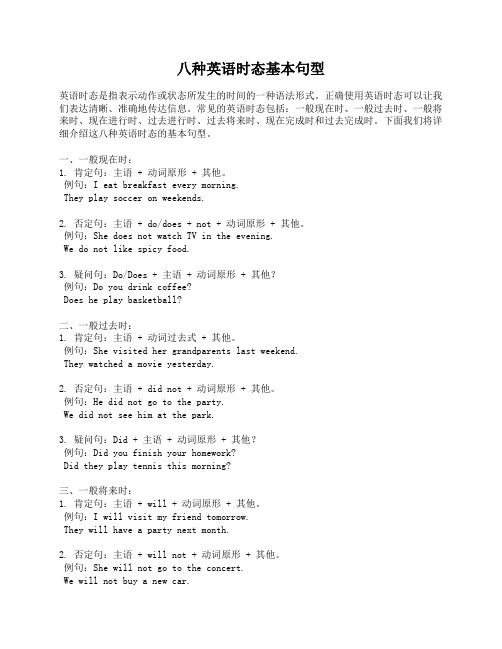
八种英语时态基本句型英语时态是指表示动作或状态所发生的时间的一种语法形式。
正确使用英语时态可以让我们表达清晰、准确地传达信息。
常见的英语时态包括:一般现在时、一般过去时、一般将来时、现在进行时、过去进行时、过去将来时、现在完成时和过去完成时。
下面我们将详细介绍这八种英语时态的基本句型。
一、一般现在时:1. 肯定句:主语 + 动词原形 + 其他。
例句:I eat breakfast every morning.They play soccer on weekends.2. 否定句:主语 + do/does + not + 动词原形 + 其他。
例句:She does not watch TV in the evening.We do not like spicy food.3. 疑问句:Do/Does + 主语 + 动词原形 + 其他?例句:Do you drink coffee?Does he play basketball?二、一般过去时:1. 肯定句:主语 + 动词过去式 + 其他。
例句:She visited her grandparents last weekend.They watched a movie yesterday.2. 否定句:主语 + did not + 动词原形 + 其他。
例句:He did not go to the party.We did not see him at the park.3. 疑问句:Did + 主语 + 动词原形 + 其他?例句:Did you finish your homework?Did they play tennis this morning?三、一般将来时:1. 肯定句:主语 + will + 动词原形 + 其他。
例句:I will visit my friend tomorrow.They will have a party next month.2. 否定句:主语 + will not + 动词原形 + 其他。
初中动词的时态与语态
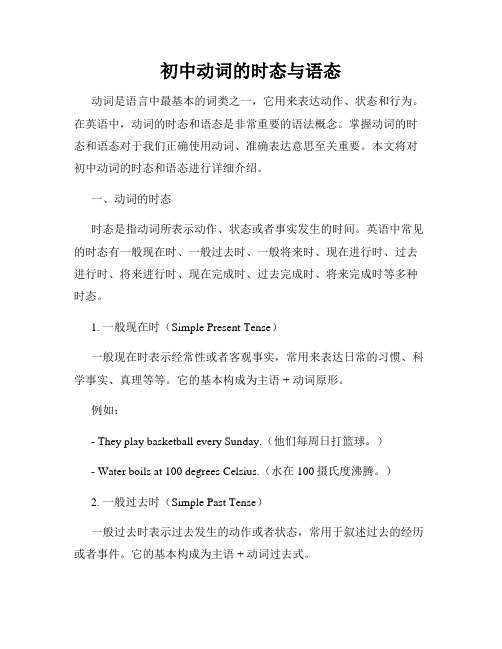
初中动词的时态与语态动词是语言中最基本的词类之一,它用来表达动作、状态和行为。
在英语中,动词的时态和语态是非常重要的语法概念。
掌握动词的时态和语态对于我们正确使用动词、准确表达意思至关重要。
本文将对初中动词的时态和语态进行详细介绍。
一、动词的时态时态是指动词所表示动作、状态或者事实发生的时间。
英语中常见的时态有一般现在时、一般过去时、一般将来时、现在进行时、过去进行时、将来进行时、现在完成时、过去完成时、将来完成时等多种时态。
1. 一般现在时(Simple Present Tense)一般现在时表示经常性或者客观事实,常用来表达日常的习惯、科学事实、真理等等。
它的基本构成为主语 + 动词原形。
例如:- They play basketball every Sunday.(他们每周日打篮球。
)- Water boils at 100 degrees Celsius.(水在100摄氏度沸腾。
)2. 一般过去时(Simple Past Tense)一般过去时表示过去发生的动作或者状态,常用于叙述过去的经历或者事件。
它的基本构成为主语 + 动词过去式。
例如:- I visited my grandparents last weekend.(我上个周末去看望了我的祖父母。
)- She didn't go to school yesterday.(她昨天没有去上学。
)3. 一般将来时(Simple Future Tense)一般将来时表示将来要发生的动作或者状态,常用于表达计划、打算、预测等等。
它的基本构成为主语 + will + 动词原形。
例如:- We will have a party next Friday.(我们下周五要举办一个聚会。
)- She won't come to the meeting tomorrow.(她明天不会来参加会议。
)4. 现在进行时(Present Continuous Tense)现在进行时表示正在进行的动作,通常用于描述当前正在发生的事情。
英语十六种时态
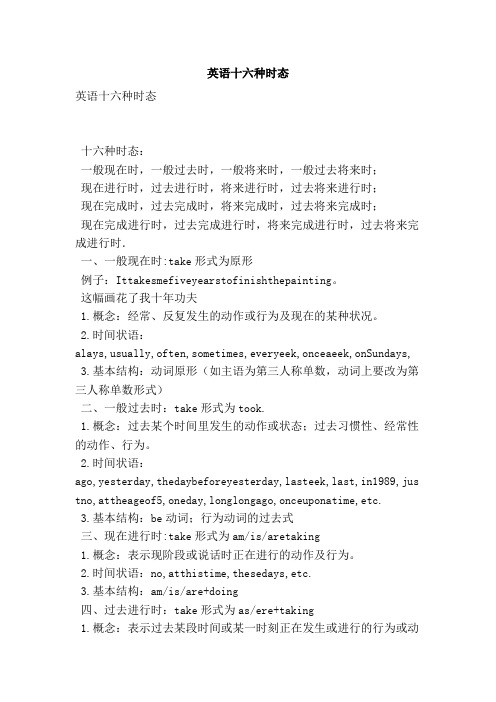
英语十六种时态英语十六种时态十六种时态:一般现在时,一般过去时,一般将来时,一般过去将来时;现在进行时,过去进行时,将来进行时,过去将来进行时;现在完成时,过去完成时,将来完成时,过去将来完成时;现在完成进行时,过去完成进行时,将来完成进行时,过去将来完成进行时.一、一般现在时:take形式为原形例子:Ittakesmefiveyearstofinishthepainting。
这幅画花了我十年功夫1.概念:经常、反复发生的动作或行为及现在的某种状况。
2.时间状语:alays,usually,often,sometimes,everyeek,onceaeek,onSundays, 3.基本结构:动词原形(如主语为第三人称单数,动词上要改为第三人称单数形式)二、一般过去时:take形式为took.1.概念:过去某个时间里发生的动作或状态;过去习惯性、经常性的动作、行为。
2.时间状语:ago,yesterday,thedaybeforeyesterday,lasteek,last,in1989,jus tno,attheageof5,oneday,longlongago,onceuponatime,etc.3.基本结构:be动词;行为动词的过去式三、现在进行时:take形式为am/is/aretaking1.概念:表示现阶段或说话时正在进行的动作及行为。
2.时间状语:no,atthistime,thesedays,etc.3.基本结构:am/is/are+doing四、过去进行时:take形式为as/ere+taking1.概念:表示过去某段时间或某一时刻正在发生或进行的行为或动作。
2.时间状语:atthistimeyesterday,atthattime或以hen引导的谓语动词是一般过去时的时间状语等。
3.基本结构:as/ere+doing五、现在完成时:take形式为have/has+taken1.概念:过去发生或已经完成的动作对现在造成的影响或结果,或从过去已经开始,持续到现在的动作或状态。
一般现在时,现在进行时,一般过去时,过去进行时,一般将来 - 改

否定句 •主语+be +not +V+ing +(宾语)+其它. •Kate isn’t listening to the music now . 一般疑问句: •Be + 主语+V+ing +(宾语)+其它成分? •Are you enjoying yourselves now? •特殊疑问句 •疑问词+be +主语+V+ing +(其它成分)? •What are they doing at the moment ? •Be(am / is are)随着主语的变化而变化。
was 10. Lucy _____(be) here just now.
过去进行时:表示在过去的某一时刻或某一时间段 正在进行的动作.这一特定的过去时间,除有上下 文提示以外,一般用时间状语来表示. 结构:was/were+动词ing 形式. 1.肯定句:主语+was/were+动词+ing . She was repairing his bike. 2.否定句:主语+ wasn’t/weren’t +动词+ing . They weren’t listening to the music when I went into the room. 3.一般疑问句: Was/Were+主语+动词+ing ? Were they knocking at the door at this moment yesterday? 4.特殊疑问句:特殊疑问词+主语+动词+ing? What was he doing when the teacher came in?
2. 现在进行时可以表示“同情、责备、强调、好 奇、不满、快乐、赞赏”等现在的感情与情绪。
时态的变化规则

时态的变化规则
时态的变化规则是指在不同语境下,动词的时态如何进行变化。
一般来说,英语中的时态分为过去时、现在时和将来时三种。
下面是各个时态的变化规则:
1. 过去时:
- 一般过去时:动词过去式
- 过去进行时:was/were + 动词-ing
- 过去完成时:had + 过去分词
2. 现在时:
- 一般现在时:动词原形
- 现在进行时:am/is/are + 动词-ing
- 现在完成时:have/has + 过去分词
3. 将来时:
- 一般将来时:will/shall + 动词原形
- 将来进行时:will/shall + be + 动词-ing
- 将来完成时:will/shall + have + 过去分词
此外,还有其他一些特殊的时态,如过去完成进行时、过去将来时等。
这些时态的变化规则在使用上较为特殊,需要根据具体语境进行了解和运用。
一般现在时--一般过去时---现在进行时--过去进行时归纳总结
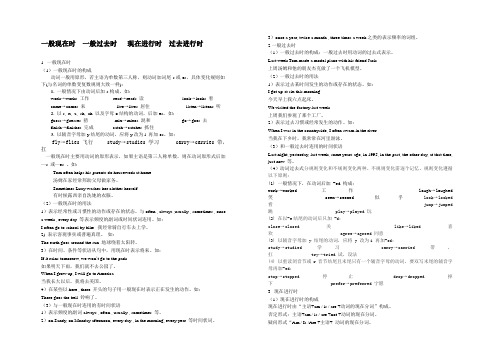
一般现在时一般过去时现在进行时过去进行时1. 一般现在时(1)一般现在时的构成动词一般用原形,若主语为单数第三人称,则动词加词尾-s或-es,具体变化规则如下(与名词的单数变复数规则大致一样):1.一般情况下由动词后加-s构成。
如:work→works 工作read→reads 读look→looks 看come→comes 来live→lives 居住listen→listens 听2.以s, x, z, sh, ch 以及字母o结构的动词,后加-es。
如:guess→guesses 猜mix→mixes 混和go→goes 去finish→finishes 完成catch→catches 抓住3.以辅音字母加y结尾的动词,应将y改为i 再加-es。
如:fly→flies 飞行study→studies 学习carry→carries 带,扛一般现在时主要用动词的原形表示,如果主语是第三人称单数,则在动词原形式后加—s 或—es 。
如:Tom often helps his parents do housework at home.汤姆在家经常邦助父母做家务。
Sometimes Lucy washes her clothes herself.有时候露西亲自洗她的衣服。
(2)一般现在时的用法1)表示经常性或习惯性的动作或存在的状态。
与often , always ,usually , sometimes , once a week , every day 等表示频度的副词或时间状词连用。
如:I often go to school by bike. 我经常骑自行车去上学。
2) 表示客观事实或普遍真理。
如:The earth goes around the sun .地球绕着太阳转。
3)在时间、条件等状语从句中,用现在时表示将来。
如:If it rains tomorrow, we won’t go to the park.如果明天下雨,我们就不去公园了。
新概念英语时态、语法大全
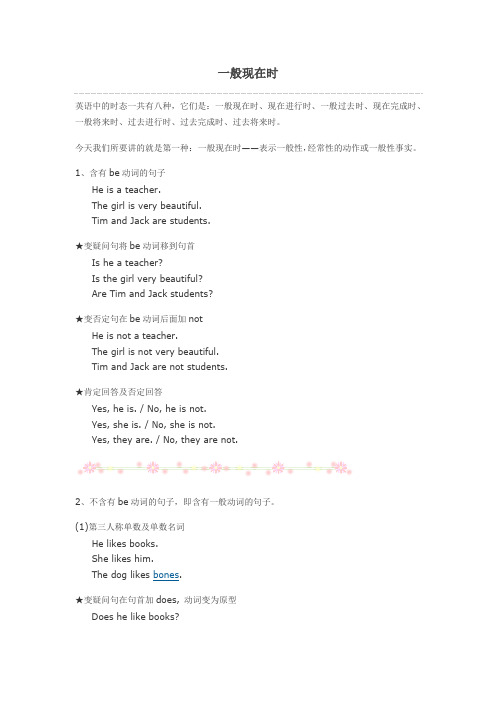
英语中的时态一共有八种,它们是:一般现在时、现在进行时、一般过去时、现在完成时、一般将来时、过去进行时、过去完成时、过去将来时。
今天我们所要讲的就是第一种:一般现在时——表示一般性,经常性的动作或一般性事实。
1、含有be动词的句子He is a teacher.The girl is very beautiful.Tim and Jack are students.★变疑问句将be动词移到句首Is he a teacher?Is the girl very beautiful?Are Tim and Jack students?★变否定句在be动词后面加notHe is not a teacher.The girl is not very beautiful.Tim and Jack are not students.★肯定回答及否定回答Yes, he is. / No, he is not.Yes, she is. / No, she is not.Yes, they are. / No, they are not.2、不含有be动词的句子,即含有一般动词的句子。
(1)第三人称单数及单数名词He likes books.She likes him.The dog likes bones.★变疑问句在句首加does, 动词变为原型Does he like books?Does she like him?Does the dog like bones?★变否定句在主语及动词之间加doesn't, 动词变为原型,原句中的动词不再有第三人称变化。
He doesn't like books.She doesn't like him.The dog doesn't like bones.★肯定回答及否定回答:Yes, he does. / No, he doesn't.Yes, she does. / No, she doesn'tYes, it does. / No, it doesn't.注意:第三人称单数形式一般在动词后面加S,不要和名词复数混淆,变否定句或疑问句时名词复数没有任何变化。
初中英语动词八大时态详解
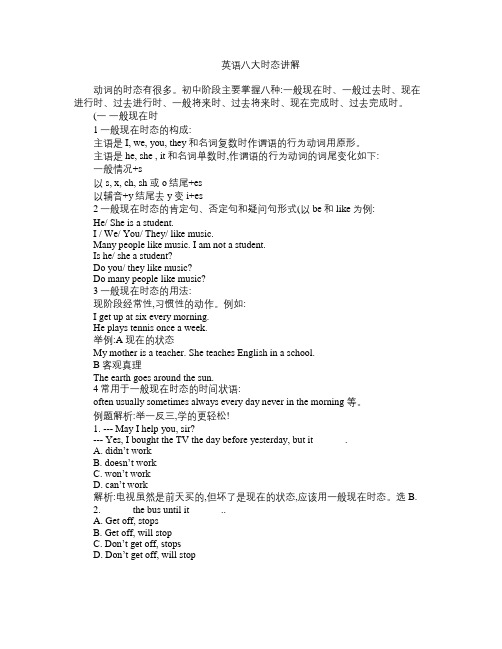
英语八大时态讲解动词的时态有很多。
初中阶段主要掌握八种:一般现在时、一般过去时、现在进行时、过去进行时、一般将来时、过去将来时、现在完成时、过去完成时。
(一一般现在时1一般现在时态的构成:主语是I, we, you, they和名词复数时作谓语的行为动词用原形。
主语是he, she , it和名词单数时,作谓语的行为动词的词尾变化如下:一般情况+s以s, x, ch, sh 或o结尾+es以辅音+y结尾去y变i+es2一般现在时态的肯定句、否定句和疑问句形式(以be和like为例:He/ She is a student.I / We/ You/ They/ like music.Many people like music. I am not a student.Is he/ she a student?Do you/ they like music?Do many people like music?3一般现在时态的用法:现阶段经常性,习惯性的动作。
例如:I get up at six every morning.He plays tennis once a week.举例:A 现在的状态My mother is a teacher. She teaches English in a school.B 客观真理The earth goes around the sun.4常用于一般现在时态的时间状语:often usually sometimes always every day never in the morning 等。
例题解析:举一反三,学的更轻松!1. --- May I help you, sir?--- Yes, I bought the TV the day before yesterday, but it ______.A. didn’t workB. doesn’t workC. won’t workD. can’t work解析:电视虽然是前天买的,但坏了是现在的状态,应该用一般现在时态。
英语动词时态表_图文
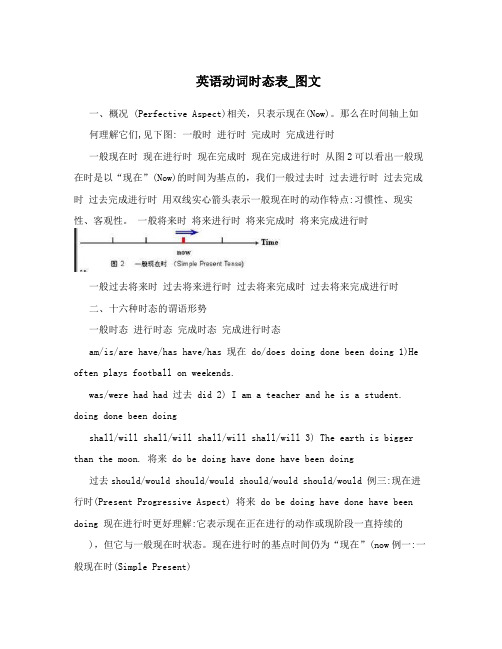
英语动词时态表_图文一、概况 (Perfective Aspect)相关,只表示现在(Now)。
那么在时间轴上如何理解它们,见下图: 一般时进行时完成时完成进行时一般现在时现在进行时现在完成时现在完成进行时从图2可以看出一般现在时是以“现在”(Now)的时间为基点的,我们一般过去时过去进行时过去完成时过去完成进行时用双线实心箭头表示一般现在时的动作特点:习惯性、现实性、客观性。
一般将来时将来进行时将来完成时将来完成进行时一般过去将来时过去将来进行时过去将来完成时过去将来完成进行时二、十六种时态的谓语形势一般时态进行时态完成时态完成进行时态am/is/are have/has have/has 现在 do/does doing done been doing 1)He often plays football on weekends.was/were had had 过去 did 2) I am a teacher and he is a student. doing done been doingshall/will shall/will shall/will shall/will 3) The earth is bigger than the moon. 将来 do be doing have done have been doing 过去should/would should/would should/would should/would 例三:现在进行时(Present Progressive Aspect) 将来 do be doing have done have been doing 现在进行时更好理解:它表示现在正在进行的动作或现阶段一直持续的),但它与一般现在时状态。
现在进行时的基点时间仍为“现在”(now例一:一般现在时(Simple Present)的动作不同:它的动作特点是进行性或持续性,我们用稍长的单实线表示我们知道,一般现在时有以下几种常见的用法:1)表示现在经常性的动作;2)表示现在的情况或状态;3)表示不受时限的客观事实或真理(实际上这些客观真理或事实都是人们以“现在”(Now)的观点或标准来做出评判的,它们仍然是人们在“现在”这个时间段里所理解、所认识的客观世界)。
英语的时态语态总结归纳

英语的时态语态总结归纳一、英语的时态总论1、英语有十种不同的时态,它们分别是:一般现在时、一般过去时、一般将来时、现在进行时、过去进行时、将来进行时、现在完成时、过去完成时、将来完成时和现在完成进行时。
2、时态的构成:时态由两个部分组成,即时和态。
时是指动词表示的行为发生的时间,态是指动词表示的行为的性质和情况,例如,进行态表示动作正在发生;完成态表示动作已发生;完成进行态表示动作已经发生且正在发生。
二、英语的时态归纳1、一般现在时:(1)表示现在习惯性的动作或存在的状况,例如,他每天早上8点起床;许多动物可以在海里游泳。
(2)表示现在客观真理,例如,太阳是由氢原子组成的;水的沸点是100摄氏度。
(3)表示目前的计划,例如,他本周末要回家;我们明天要去游览新宫。
2、一般过去时:(1)表示过去的习惯性动作或状况,例如,他以前每天早上8点起床;我上学时常跟朋友一起去游泳。
(2)表示过去的发生的事情,例如,他昨天回到家;我上周去参加会议。
(3)表示过去经常或反复发生的事情,例如,他经常和他的老师打电话;我总是在每次考试前担心。
3、一般将来时:(1)表示即将发生的动作或状况,例如,他明天早上起床要9点;我们下周要去海边度假。
(2)表示预定的计划,例如,他明天要回家;我们星期六要参加聚会。
(3)表示将来可能发生的情况,例如,这个孩子将来会很有名;这个项目很有可能会成功。
4、现在进行时:(1)表示正在进行或发生的动作,例如,他正在做家务;我正在学习英语。
(2)表示现在状况,例如,天气正在变凉;成绩正在提高。
5、过去进行时:(1)表示过去正在进行的动作,例如,他昨天晚上正在复习;我过去常常和朋友在一起玩。
(2)表示过去的临时动作,例如,他昨天晚上正在看书;我昨天正在准备考试。
6、将来进行时:(1)表示将来正在进行的动作,例如,他明天晚上正在打乒乓球;我们下星期一正在学习英语。
(2)表示将来临时动作,例如,他明天晚上正在看电视;我们下星期二正在准备考试。
动词时态变化规则

动词时态变化规则时态是语法中一个重要的概念,它用来表示动作或状态发生的时间。
在英语中,动词时态的变化规则较为复杂,涉及到不同的时态形式和时态动词的变化。
本文将介绍一些常见的动词时态变化规则,帮助读者更好地理解和运用英语时态。
一、一般现在时(Simple Present)一般现在时用来表示经常性、习惯性或普遍性的动作或状态。
动词在第三人称单数形式下要加 -s 或 -es 结尾。
1. 主语为第一、二人称或复数形式时,动词不做任何变化。
例:I love playing basketball.例:They often go hiking on weekends.2. 主语为第三人称单数形式时,动词要加 -s 或 -es 结尾。
例:She likes to read novels.例:The dog barks at strangers.3. 特殊情况:- 动词以 -sh、-ch、-s、-x 或 -o 结尾,时态变化规则为动词 + -es。
例:He watches TV every evening.例:My father fixes the car himself.- 动词以辅音字母 + y 结尾,将 y 改为 i,加 -es。
例:She studies hard for the exam.例:He tries his best to solve the problem.二、一般过去时(Simple Past)一般过去时用来表示过去发生的动作或状态。
一般过去时的动词大部分是在动词原形末尾加 -ed。
不规则动词有自己的过去时形式。
1. 动词以辅音字母 + y 结尾,将 y 改为 i,加 -ed。
例:He studied English literature in university.例:They carried the heavy boxes into the truck.2. 动词以 -e 结尾,直接加 -d。
一般现在时-一般过去时-一般将来时及现在进行时
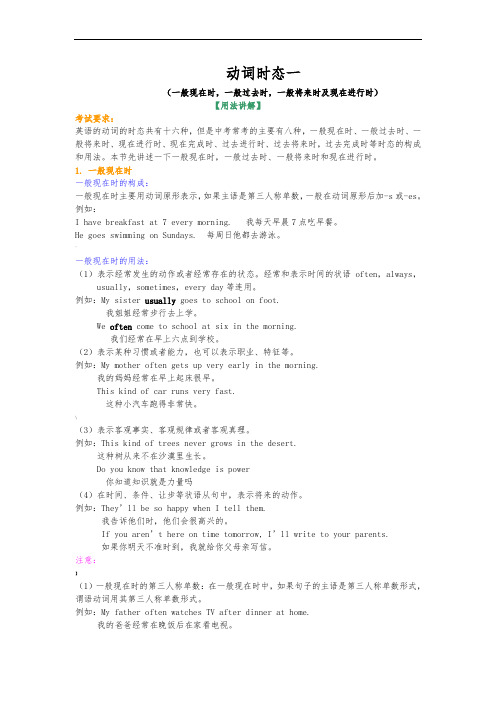
动词时态一(一般现在时,一般过去时,一般将来时及现在进行时)【用法讲解】考试要求:英语的动词的时态共有十六种,但是中考常考的主要有八种,一般现在时、一般过去时、一般将来时、现在进行时、现在完成时、过去进行时、过去将来时,过去完成时等时态的构成和用法。
本节先讲述一下一般现在时,一般过去时、一般将来时和现在进行时。
1. 一般现在时一般现在时的构成:一般现在时主要用动词原形表示,如果主语是第三人称单数,一般在动词原形后加-s或-es。
例如:I have breakfast at 7 every morning. 我每天早晨7点吃早餐。
He goes swimming on Sundays. 每周日他都去游泳。
^一般现在时的用法:(1)表示经常发生的动作或者经常存在的状态。
经常和表示时间的状语often,always,usually,sometimes,every day等连用。
例如:My sister usually goes to school on foot.我姐姐经常步行去上学。
We often come to school at six in the morning.我们经常在早上六点到学校。
(2)表示某种习惯或者能力,也可以表示职业、特征等。
例如:My mother often gets up very early in the morning.我的妈妈经常在早上起床很早。
This kind of car runs very fast.这种小汽车跑得非常快。
\(3)表示客观事实、客观规律或者客观真理。
例如:This kind of trees never grows in the desert.这种树从来不在沙漠里生长。
Do you know that knowledge is power你知道知识就是力量吗(4)在时间、条件、让步等状语从句中,表示将来的动作。
例如:They’ll be so happy when I tell them.我告诉他们时,他们会很高兴的。
